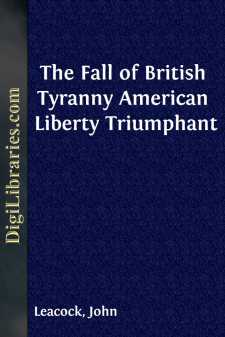Categories
- Antiques & Collectibles 13
- Architecture 36
- Art 48
- Bibles 22
- Biography & Autobiography 813
- Body, Mind & Spirit 142
- Business & Economics 28
- Children's Books 17
- Children's Fiction 14
- Computers 4
- Cooking 94
- Crafts & Hobbies 4
- Drama 346
- Education 46
- Family & Relationships 57
- Fiction 11829
- Games 19
- Gardening 17
- Health & Fitness 34
- History 1377
- House & Home 1
- Humor 147
- Juvenile Fiction 1873
- Juvenile Nonfiction 202
- Language Arts & Disciplines 88
- Law 16
- Literary Collections 686
- Literary Criticism 179
- Mathematics 13
- Medical 41
- Music 40
- Nature 179
- Non-Classifiable 1768
- Performing Arts 7
- Periodicals 1453
- Philosophy 64
- Photography 2
- Poetry 896
- Political Science 203
- Psychology 42
- Reference 154
- Religion 513
- Science 126
- Self-Help 84
- Social Science 81
- Sports & Recreation 34
- Study Aids 3
- Technology & Engineering 59
- Transportation 23
- Travel 463
- True Crime 29
The Fall of British Tyranny American Liberty Triumphant
by: John Leacock
Categories:
Description:
Excerpt
JOHN LEACOCK
Among the elusive figures of early American Drama stands John Leacock, author of "The Fall of British Tyranny," published in 1776, in Philadelphia. Even more elusive is the identification, inasmuch as his name has been spelled variously Leacock, Lacock, and Laycock. To add to the confusion, Watson's "Annals of Philadelphia," on the reminiscent word of an old resident of that town, declares that Joseph Leacock penned "The Medley." "He wrote also a play, with good humour," says this authority, "called 'British Tyranny.'" On careful search of the files, no definite information in regard to Leacock has been forthcoming. The dedication to "The Fall of British Tyranny" was signed "Dick Rifle," but there is no information to be traced from this pseudonym.
Searching the Colonial Records of Pennsylvania, I discovered no less than three John Leacocks mentioned, all of whom were Coroners, as well as a Joseph Leacock, who occupied the same position. Examining the Records of the Pennsylvania Soldiers of the Revolution, I found several John Leacocks in the ranks as privates, and also one John Laycock.
Professor Moses Coit Tyler, in his "Literary History of the American Revolution" (ii, 198), giving a list of the characters in the play and the names of those supposed to be lampooned, analyzes the piece thoroughly, and says, "From internal evidence, it must be inferred that the writing of the play was finished after the publication of 'Common Sense' in January, 1776, and before the news had reached Philadelphia of the evacuation of Boston, March 17, 1776." Though Sabin takes for granted that Leacock wrote "The Fall of British Tyranny," Hildeburn, in the "Issues of the Press" (ii, 249), states that it is "said to have been written by Mr. Laycock of Philadelphia." If the John Leacock, whose name appears in the Philadelphia Directory of 1802, is the one who wrote "The Fall of British Tyranny," following that clue we find his name disappearing from the Directory in 1804. Hence, he must either have died, or have moved away from Philadelphia.
The elusive name of Leacock is to be considered also in connection with an opera entitled, "The Disappointment; or, The Force of Credulity," signed by Andrew Barton, supposed to be a pseudonym, and attributed variously to "Colonel" Thomas Forrest and to John Leacock. I already have had occasion to mention "The Disappointment" in connection with Godfrey's "The Prince of Parthia." The reader will remember that in 1767 "The Disappointment" was put into rehearsal, but was suddenly withdrawn in preference to Godfrey's piece. This play has been fully and interestingly analyzed by O. G. Sonneck, who gives the reasons for the withdrawal of the play from rehearsal by the American Company of Philadelphia, 1767. These reasons are definitely stated in the Pennsylvania Gazette for April 16, 1767, which contains this warning in the American Company's advertisement of "The Mourning Bride": "N.B. 'The Disappointment' (that was advertised for Monday), as it contains personal Reflections, is unfit for the Stage."
The reason why this piece is attributed to "Colonel" Thomas Forrest is that there is a memorandum in substantiation on the title-page of a copy owned by the Library Company of Philadelphia....


